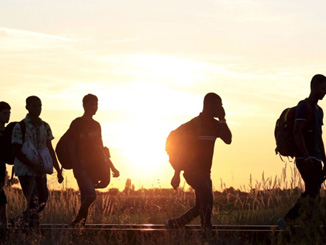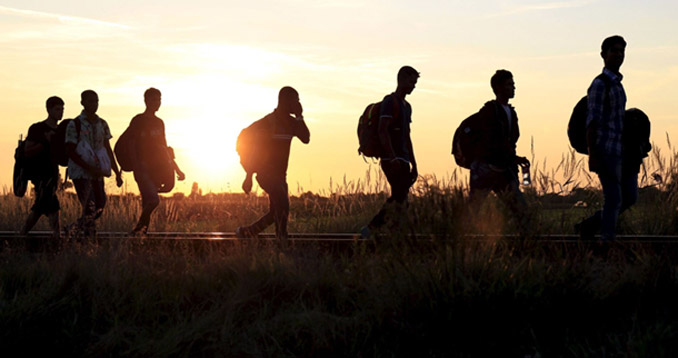

Hasht-E Subh The suffering of displacement and migration is a devastating and unforgettable pain for every person. The citizens of Afghanistan have suffered countless calamities, including homelessness and statelessness, in various historical developments. With the collapse of the republic system to the Taliban’s control on August 15, 2021, thousands of citizens of this country were forced to leave Afghanistan. Meanwhile, more than three million citizens of the country took refuge in Pakistan and most of them are still living in this country. Thousands of them are still waiting to receive visas in the exit plans of the destination countries.
However, the Ministry of Interior of Pakistan has recently published a newsletter asking citizens of other countries, especially Afghans living in this country illegally and whose visas are expired, to leave Pakistan by December 31, 2022, within the next 40 days. Based on this newsletter, people who stay illegally in this country for more than one year will be blacklisted in this country, and the presence of most of these people illegally in this country will lead to up to three years in prison. This action of the Pakistani government has caused widespread concern among Afghan immigrants in this country.
By publishing a newsletter on its official website, the Ministry of Interior of Pakistan has made public a plan based on which the citizens of other countries who have spent a year in this country and leave Pakistan after their visa expires, will be given permission to leave by December 31. It is given without penalty.
In its newsletter, the Ministry of Interior of Pakistan called this plan “Amnesty Plan for Foreign Nationals” and said that for foreign citizens who have stayed in this country for one year and now their visas have expired, permission to leave without penalty will be granted. People who have stayed in this country for more than one year without a visa will be issued an exit permit in return for a penalty amount.
The ministry has emphasized that until the end of December 31, 2022, there will be no legal action against foreign nationals who use this amnesty plan. Part of this plan states: “According to the 1946 law, foreign nationals who overstay can be sentenced to three years in prison.” Pakistan’s Ministry of Interior has also said: “After December 31, 2022, measures will be put in action against foreign nationals who stay for more than one year.” “Furthermore, they will be blacklisted for further entry into Pakistan.”
A number of Afghan citizens who fled to Pakistan after August 15, 2021, speaking to Hasht-e Subh, say that in addition to several other problems that they have been tolerating daily, the new order of the Ministry of Interior of Pakistan has made them more worried. These immigrants confirm that in order to avoid facing any authority from the police departments, they stay at home and try to minimize public exposure.
This is despite the fact that after the completion of the evacuation process from the Kabul airport last year, thousands of citizens of the country have migrated to Pakistan so as to use this route as an exit route to their final destination country. Now that the exit process has taken time, Afghan immigrants in Pakistan are dealing with extensive problems and are also facing the risk of being imprisoned as a group.
Najiba is one of the thousands of Afghan immigrants in the city of Karachi, where more than a thousand Afghan citizens were imprisoned by the police of this city few weeks back. Speaking to Hasht-e Subh, Najiba says, “I’m afraid. I haven’t left the house for three days. I was going out before the announcement of the Ministry of Interior of Pakistan. The number of police rangers in the area have increased since the announcement. Our appearance is the very clear identity of us that we are Afghan and can be very easily tracked by the police. I have locked myself at home for the last three days and have not been out. I try to make my child also remain at home.”
Najiba adds, “there is no possibility to extend the visa. If I were to get a new visa, I would have to leave Pakistan, which is not possible for me. Online visas are offered in the black market for 1,500 US dollars, which is very expensive. The situation of immigrants in Karachi is pathetic. The police are following them step by step.”
In addition, the warning of the Ministry of Interior of Pakistan has heated up the market of commission workers in this country. A number of Afghan immigrants told Hasht-e Subh that they do not receive any response from the Ministry of Interior of Pakistan for the extension of their visas, and because of the fear of being arrested by the police of this country, they are forced to pay more than 30,000 Pakistani Rs to the agents for the extension of each visa. Paying for several members of a family at the same time has made it difficult for them.
Meanwhile, a number of Afghan immigrants in the city of Peshawar confirmed in an interview with Hasht-e Subh that Afghan immigrant citizens in this city are facing several challenges and are harassed by the police. Mrs. Haidari is one of the Afghan immigrants who currently lives in Peshawar. Speaking to Hasht-e Subh, he said, “it’s been three and a half months since I came from Afghanistan. After several attempts via agents, we could finally get a three-month medical visa. Renting a house with Afghani documents was another challenge. We cannot roam around the city freely and the police usually harass us for the sack of money.”
Similarly, another Afghan immigrant in Peshawar, speaking on behalf of a group of journalists and civil society and human rights activists, told Hasht-e Subh: “The mental and emotional state of the immigrants is very bad. Peshawar police harass immigrants for the sack of money. No one’s visa will be extended, if you don’t have a visa, due to lack of an updated visa, the house owners either do not cooperate or charges way more than the usual rate. Financial burdens and challenges are the other issues. Due to lack of documents, we cannot use public health services and have no option but to use private hospitals. Health care has turned into a major matter of concern. “The condition of the immigrants here is very bad.”
Another immigrant, who does not want to be named in this report, told Hasht-e Subh that in addition to the problems of the police and the non-renewal of visas, now a large number of house owners do not return the money that they initially received as a down payment (guarantee). The house owners miss use the situation and usually reject the amount payable to tenants.
In addition, a number of Afghan expatriate citizens in Pakistan say that the police of this country in different areas of Islamabad and Rawalpindi address the houses of expatriates and take money from them under various pretexts. According to them, when the police check the contract of the houses, they try to find a deficiency in the contract as to why only one person’s name is mentioned in the contract. These immigrants confirm that they have to pay the Pakistani police to get rid of this problem.
One of the journalists who live in the Rawalpindi region of Pakistan says: “We have been in Pakistan for 9 months. Those who do not have a visa or have problems with their passports face many challenges. The men take us to the mosque and check the guesthouses, and girls are not usually safe in this city. The police took away my brother and snatched his money. We are worried about how long this situation will last. We registered at the (UNHCR) office, the organization has no level of authority to help the immigrant communities, and the Pakistani police usually do not accept the UNHCR documents.”
Speaking to Hasht-e Subh, another migrant said: “It only affects people who have been smuggled into Pakistan. He even took the money. Today I went to Avan Market in Rawalpindi. Many Afghans without visas were picked up by the police and fined. But they have nothing to do with those who are registered in the Office of the High Commissioner for Refugees and came to Pakistan with a visa.”
At the same time, most of the Afghan immigrants in Pakistan also complain to the Office of the High Commissioner for Refugees (UNHCR). According to them, a number of those who passed their first interview last year at this UN representation, have not been called for the second interview. Speaking to Hasht-e Subh, they claim that the agents usually facilitate the interviews via their connection within the UNHCR office. But Hasht-e Subh could not find a document to approve the claim so far.
Omid is one of the thousands of immigrants who had their first interview at the Office of the High Commissioner for Refugees last year. Now, after a year and despite many efforts, he still has not managed to take his second interview. In this institution. Speaking to Hasht-e Subh, he says that when Afghan refugees visit the office of the High Commissioner for Refugees (UNHCR), they blame the Pakistani government for the creation of problems and vice versa when talking to the Pakistan Ministry of Interior.
However, a number of Afghan immigrants who have spoken about the problems of immigrants with the United Nations representation in Pakistan, quoted by the High Commissioner for Refugees (UNHCR) say that this organization pays 3 US dollars per day to the Pakistani government for every Afghan immigrant. But the government of this country has demanded to pay 5 dollars a day, which has not been accepted by this organization, and this has also slowed down the work process of cases. It should be noted that Hasht-e Subh has not succeeded in confirming this information from the representatives of the Office of the High Commissioner for Refugees (UNHCR), despite several attempts and calls.
So far, the police arrested more than 1000 Afghan citizens, including women and children, from the province of Sindh weeks ago. This action of the Pakistani police also met with widespread reactions, but it did not leave a positive result for the Afghan immigrants in Pakistan.
Amin Kawa-Senior Reporter and Analyst, Hasht-e Subh Daily

Leave a Reply